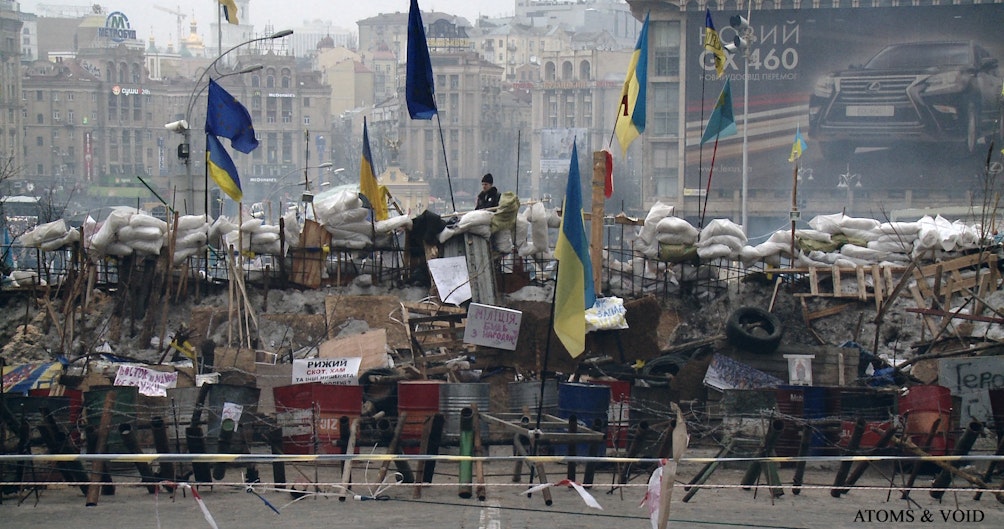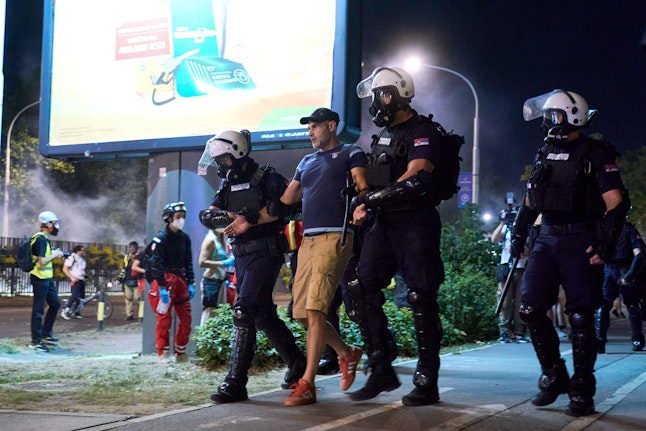On 24 February, Russia invaded Ukraine – a democratic European country. As the European Greens, we have condemned Putin's war. This invasion is an outright attack on Ukraine's sovereignty and a flagrant violation of international law. It is not only an attack on Ukraine's territorial integrity, but a brutal assault on the rule of law, democracy, and peace in Europe – the foundations on which the European Union was built in the aftermath of World War II.
As part of the Green Screen project, which engages citizens in contemporary issues through films and debates, we explored the recent past to better understand the struggles of the people of Ukraine over the last decade, as well as their political and social demands. In 2010, President Yanukovych is elected, and despite promising EU membership to the public, he pursued a deal with Russia that went against the people's will. What resulted is what we now call the Maidan Revolution.
Last month, we featured the documentary film 'Maidan' (2014) and held a debate on the people of Ukraine's struggle for freedom and democracy. It chronicles the civil uprising against the regime of President Yanukovych, which took place in Kyiv in the winter of 2013-2014. The film follows the progress of the revolution: from peaceful rallies, half a million strong, in Maidan Square, to bloody street battles between protestors and riot police. The film is a portrait of an awakening nation rediscovering its identity. Director Sergei Loznitsa rises above current political issues and looks at the nature of the popular uprising as a social, cultural and philosophical phenomenon.
In a speech on Maidan square, these words are spoken:
"[Putin] says them and us are the same nation. Dear Vladimir Vladimirovich, you got it wrong. Your nation is Russian. Our nation is Ukrainian. We are different nations. We are different countries. And we insist that you respect us in the same way that we respect you. We shall not allow anyone, be it the Russian president or anyone else, to belittle us and to show contempt for the Ukrainian nation."
Watch now: Ukraine's struggle for freedom and democracy: the shock of 24 February
The Maidan Revolution in Kyiv illustrated in the film 'Maidan' gives us pause for reflection as we witness the horrors of the Russian invasion of Ukraine today. It was the spark which initiated the country's struggle for democracy. During the debate, journalists, activists, academics, and politicians who have been working in Ukraine shared their unique perspectives. They discussed Russia's post-Soviet ambitions to control its former states, the Maidan Revolution, and how the events of 2013 and 2014 are connected to today's war.
The panellists touched on the incredible mobilisation of Ukrainian civil society, which started during the Maidan Revolution and now serves as a strong force of solidarity and support for people throughout the country. Sofia Oliynyk, Program Coordinator for the Heinrich Boell Foundation, explains how mutual aid networks have sprung up throughout Ukraine, connected through digital platforms like Telegram. She explains that people are not giving up and continue to resist. Nastya Stanko, Broadcast Journalist for Hromadske mentioned how the power of the people gives her hope to live another day and face all the pain and suffering caused by the war. Roeland Termote, Reporter for De Standaard, also relays the remarkable solidarity that has formed in its neighbouring country, Poland, to aid refugees in finding safety.
Nastya Stanko mentions that the biggest issue coming from journalists from abroad, is that some part of Ukraine is pro-Russian, while another is pro-European. She says: "There is no different Ukraine, and different Ukrainians who want to join Russia. This narrative was also wrong when we were talking about the Donbass region. (...) People were just under the Russian propaganda." They spoke about Russian propaganda and its effects, which do not only impact geopolitics but also fragment families. At times, the experience of people in Ukraine is being denied by their relatives living in Russia. On sharethetruth.org, Sofia Oliynyk has dedicated herself to sharing short briefs about what is happening on the ground and fact-checking the Russian media. She states that:
"Russia is trying to treat Ukraine as one of those colonies that needs help from the bigger brother. But the bigger brother is not a brother; they are killing and shelling. We see 1,200 missiles hitting Ukraine within a month. This is not a peacekeeping mission. This narrative of saving, protecting, and preventing genocide? I think that genocide is already happening in Mariupol."
Debate highlights
"What we witness right now from the perspective of civil society is quite immense. (...) We saw how civil society has come to the stage during Maidan and how it became this key player for Ukrainian independence and democracy that we are fighting for now in 2022 – which is ridiculous, but this is the reality we are living. [The Heinrich Boell Foundation] works very closely on supporting grassroots activists and the civil society in Ukraine in different fields: sustainable mobility, urban development, critical history, gender, democracy, or environmental issues. Today, we would love that our partners would be dealing with these issues but today they are volunteering to help their friends either by collecting humanitarian aid or joining territorial defence units. (...) We have to recognize the role of the civil society and volunteers who are doing all that can be done just to save people, animals, and children." - Sofia Oliynyk, Program Coordinator 'Democracy Support and Human Security', Heinrich Boell Foundation
"I'm working in the news and do interviews every day. I was in Kharkiv a couple days ago and situation there is more dangerous than in Kyiv of course because in some districts in Kharkiv there are 100 000 people for example are still living in the bomb shelters. They have fled their apartments which are destroyed. The eastern part of Kharkiv is the closest part to the Russian army now and it's destroyed from everything: tanks, shelling, rockets. (...) But what I see in all this evil is volunteers who help 100,000 people and they came together for 24 hours, with food with medicine, with everything. In the army hospital in Kyiv, the biggest hospital for soldiers, I saw volunteers who were working as medical volunteers in the Maidan Revolution, and they said, 'we organised in a couple of hours when the war started because we were here from the Maidan Revolution and then after when war was beginning in 2014 in Donbass'." - Nastya Stanko, Broadcast Journalist, Hromadske
"I think countries such as Russia and its intelligence services have managed to exploit divisions within societies. They have managed to exploit the fact that information spaces have been narrowing, and they have managed to act as the suppliers of disinformation for states with an already propagandistic media apparatus. (...) We've been allowing freedom of journalists and freedom of expression to be whittled away even in the European union and we're still allowing it while saying that we are standing with Ukraine. Compromising on the pluralism of the media in Hungary, Poland or accession countries such as Serbia in the name of solidarity with Ukraine would be the most cynical outcome." - Roeland Termote, Reporter specialised in Central Europe, De Standaard
Caption: Pretty Loud is the first Roma Girl Band from Serbia. They proudly blend rap and hip-hop vocal styling with ancestral Roma music, and contemporary and urban movement with traditional dance. Through their lyrics and writing they talk about their everyday challenges and hopes as well as more complex topics such as race, representation, and social justice.
The European Green family stands in support of Ukraine and its people and condemns President Putin's war against Ukraine in the strongest way possible. Russia's full-fledged invasion constitutes an outright attack on Ukraine's sovereignty and is a flagrant violation of international law. We have joined gatherings calling for peace in Ukraine and will continue to do so. We have called for additional sanctions to be stepped up and implemented, phasing out the import of gas, oil and minerals from Russia, and speeding up the energy transition to enhance our energy independence and security, amongst other measures. Read our statement for more information.

